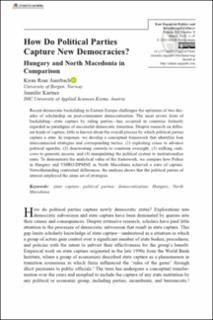How Do Political Parties Capture New Democracies? Hungary and North Macedonia in Comparison
Journal article, Peer reviewed
Published version

Åpne
Permanent lenke
https://hdl.handle.net/11250/2989252Utgivelsesdato
2022Metadata
Vis full innførselSamlinger
Sammendrag
Recent democratic backsliding in Eastern Europe challenges the optimism of two decades of scholarship on post-communist democratization. The most severe form of backsliding—state capture by ruling parties—has occurred in countries formerly regarded as paradigms of successful democratic transition. Despite research on different kinds of capture, little is known about the overall process by which political parties capture a state. In response, we develop a conceptual framework that identifies four interconnected strategies and corresponding tactics: (1) exploiting crises to advance political agendas, (2) deactivating controls to constrain oversight, (3) milking cash-cows to generate income, and (4) manipulating the political system to institutionalize rents. To demonstrate the analytical value of the framework, we compare how Fidesz in Hungary and VMRO-DPMNE in North Macedonia achieved a state of capture. Notwithstanding contextual differences, the analysis shows that the political parties of interest employed the same set of strategies.
